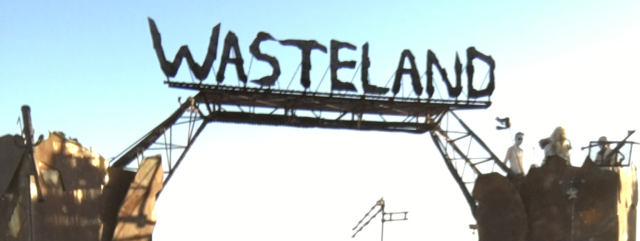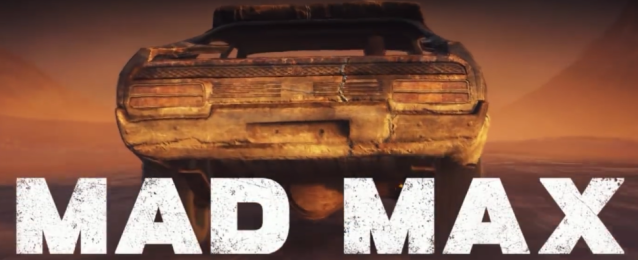A rusty doorknob creaked side to side, stopping for a moment before the inner handle fell out of the frame. The clang of a brass knob hitting rotten wood rang through the house. An annoyed grumble echoed from outside.
The door burst open with a thunderous roar, showering the hallway in natural light and revealing a dust-covered bear-like man dressed in flayed military fatigues. His exposed calves and forearms were muscled and hairy. The man reached for his leather slouch hat, adjusting the hefty chain of 7.62mm rounds serving as a hatband. Outwardly, James Gray had hardly changed since the war.
Cracked leather boots tracked California dirt into the house. The floor cried out with each thunderous step, covering the sound of a rumbling stomach. Each movement caused the medals dangling from Gray’s chest to harmoniously chime like wind bells in the Mo-Javi breeze, only to be silenced by a gentle hand.
The bushman scanned the wall, analyzing the house’s decayed walls. The wallpaper had peeled and curled like sunburnt skin. The blast was too far away to destroy the house, but the heat must have been unbearable. Nobody had been here since the war, probably with good reason.
The man twitched at a creak from the other side of the house. Drawing a long chrome pistol from his belt, James Gray pressed his back to the wall and shimmied toward the end of the hallway. A gust of dry desert air from behind reminded the bushman his entrance had not been subtle. He wasn’t worried. No one dared cross a bushman.
Emerging into a dining room and kitchen, Gray lowered his weapon. On the kitchen table was a multicolored blob of wax partially melted onto a scrap of blacked paper. In the kitchen, Gray scrounged through the grimy cupboards, some hanging from a single hinge. Empty. Not even the ants remained. Despite his rumbling stomach, James Gray was not exceptionally disappointed. He hadn’t come here for food.
Gray next discovered the master bedroom. Upon opening the door, he instinctively shielded his eyes from the natural light. A portion of the ceiling had come crashing down on top of the bed. Anyone lying there would have been crushed under an avalanche of tile, wooden splinters, and stained yellow insulation.
Gently closing the door, Gray resumed his search. He reached for another brass knob opposite the master bedroom, the handle dwarfed in his hand. It was cold, frigid even. Exactly what he was looking for, but not what he expected. Gray opened the door.
From the wasteland to the rad-lands, James Gray had explored dozens of abandoned homes. In that time, he had seen more vacant children’s rooms than he cared to admit. The bushman had grown cold to these sights long ago, yet something about this place caught his attention.
The room was pristine, as though untouched by war or decay. The walls were dark blue and peppered with translucent plastic stars. A vibrant yellow lamp surrounded by planets hung from the ceiling. Swallowing and biting his lip, Gray gained insight into the life of a child younger than the war that killed him.
Curious, Gray opened a toy box resting at the foot of the bed. Stuffed animals, toy soldiers, building blocks, and a few balls. Nothing particularly useful now. Laying on top of the pile was a well-loved plastic space man. Gray smiled softly, remembering his own Lunar Larry.
The war had cut his childhood short. He was drafted for reasons he didn’t understand, enlisted as a bushman, handed a fusion pistol, and sent to the Americas. He never truly understood why they fought. He was sure someone did, General Kass perhaps.
Picking up the toy astronaut, Gray tried to move the arms, but found its joints stiff and rigid. Captivated in childlike wonder, the bushman pressed a button on the center of the toy’s body. A low roar ripped through the silence. Panicking, the bushman turned the toy over to find the thrusters of the spaceman’s jetpack vibrating and glowing with red light. Amazed the thing still had power, Gray popped open the back of the spaceman’s back and found four thin batteries.
A dark spot on the wall caught the Gray’s attention just before he removed the first power cell. Goosebumps crawled up the man’s arms as he lifted his head to discover the shadow of a small boy, forever burned onto the wall; eternally caught between life and death. The figure seemed almost calm, as though he was watching some distant battle from the window. A smirk crept across the bushman’s face.
“Oh ello.” Gray said, rummaging through his external frame backpack. “I’ve got something for you.”
Producing a teddy bear, Gray looked away from the shadow. The bushman tossed the stuffed animal on the bed’s rocket ship comforter, returned the Lunar Larry to the toy box, and promptly left the room, closing the door behind him. Gray took a few deep breaths and stroked his beard.
Dealing with shadows was always a gamble. Some of them were cooperative, even generous. Some were malicious and aggressive, preying on anyone or anything that entered their tomb. The bushman was worried he may have angered the child. Gray’s eyes moistened for an instant before he wrinkled his nose and returned to the dining room. He had a good feeling about this one.
The room was different somehow. Warmer, hazier, like a dream. At last Gray realized the melted wallpaper had been miraculously healed. The air grew dense, as though an unseen fog flooded the room. Gray was forced to breathe through his mouth as his nose felt like it was full of dry spiderwebs. Hearing a soft high-pitched giggle, the bushman drew his pistol again.
Against the wall was the shadow of a small boy, still in a neutral position, though now the silhouette of a teddy bear dangled by his side. The bushman instinctively pulled his slouch hat over his eyes.
Gray opened his mouth but could not bring himself speak. He always found it difficult to interact with a shadow once they noticed him. After a moment, a nervous stutter broke the silence. “I-I had hoped you could elp me find someone.”
Another soft giggle echoed from all sides. The muscles on the bushman’s neck visibly tightened, anticipating an inevitable escalation.
“I’m looking for other Australians.” Gray called out, a slight tremble in his baritone voice. “Shadows who look like me.” With eyes still glued shut, the soldier ran a hand along the brim of his hat. “Have you seen em?”
A warm meaty aroma snaked up the bushman’s nose, clearing his sinuses. Gray’s stomach rumbled again. Hearing a soft thud to his right, the bushman cautiously lifted his headgear and looked at the dining table, where a metal lunchbox stamped with an image depicting the first moon landing now laid.
“For me?” Gray asked. The man turned his head toward the wall to find that, perplexingly, the boy was gone.
Gray picked up the lunchbox, surprised to find it had some weight. Not wanting to risk further interaction with a shadow, the bushman briskly walked toward the half attached front door, still swinging in the desert breeze. Closing the door as best he could, Gray stopped to look upon the words scrawled on the door fat, chalky letters. “CURSED EARTH.”
Stomach still growling like an angry gilabeast, Gray popped open the lunchbox and found a sandwich perfectly wrapped in plastic, as well as a thermos. Sitting on the front steps of the house, taking in the dry heat of the Mo-Javi desert, the man tore the packaging away like a wild animal. Taking the first bite, Gray closed his eyes and leaned his head back as he chewed. It was genuine ham and cheese. The bushman hadn’t tasted real pork in years. He took another bite, savoring a flavor he might never enjoy again. Maybe there were still pigs further south, where the radiation wasn’t so bad.
Time slowed as the bushman took another bite. He breathed in slowly before exhaling long and hard. His legs quivered from being on his feet for so long. Between running errands for Kass, encounters with wasteland undesirables, and the constant nightmares, this was one of the few quiet moments the Gray had enjoyed in a long time.
Listening to the whispers of the swirling Mo-Javi wind with closed eyes, James Gray felt as though all the troubles of the wasteland were no longer important. The bushman slowly stroked his prickly beard, lost in a moment of silence and serenity. The distant pop of gunfire whisked the tired man back to reality.
Finishing the sandwich, the Gray next removed the thermos. The plastic tube, which was much lighter than it appeared made an unusual metallic rattle, like old world coins caught in a vending machine. Confused, the bushman poured the contents into his hand. The container was empty, save for an icy metal chit. It was a dog-tag. Oddly, it was brass on one side and copper on the other, as though a mix of both A.R.E. and Australian dog-tags. Tightening his eyes, Gray turned the thing over, trying to determine who this extremely rare piece of currency had once belonged to. The chit’s only engraving read: “C. SARLUM.”

